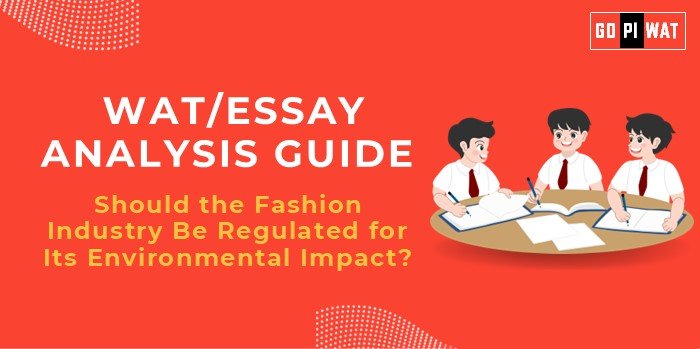📋 Written Ability Test (WAT)/Essay Analysis Guide
🌍 Should the Fashion Industry Be Regulated for Its Environmental Impact?
🌟 Understanding the Topic’s Importance
This essay topic evaluates a candidate’s understanding of global business practices, ethical responsibility, and environmental economics. Its relevance lies in linking consumerism, sustainability, and corporate accountability—key themes for B-schools.
📝 Effective Planning and Writing
- Time Allocation:
- Planning: 5 minutes
- Writing: 20 minutes
- Review: 5 minutes
- Preparation Tips:
- Research facts about environmental and economic impacts.
- Note key stakeholders and their interests.
📚 Introduction Techniques
- Contrast Introduction: “While fashion drives $2.5 trillion in global revenue, it remains one of the most polluting industries, challenging the balance between economic growth and ecological health.”
- Solution-Based Start: “Eco-regulations for fashion could transform it into a driver of sustainable innovation, benefiting both the economy and the environment.”
📖 Structuring the Essay Body
- Achievements:
- Success in organic cotton production and zero-waste designs.
- Highlight innovative firms like Levi’s, reducing water usage by 96% in denim production.
- Challenges with Comparative Analysis:
- Inconsistent regulatory frameworks across nations.
- Limited adoption of circular economy models in fast fashion hubs.
- Future Outlook:
- Technological advancements in sustainable materials.
- Increasing collaboration for global eco-certification standards.
📄 Concluding Effectively
- Balanced Conclusion: “Regulating the fashion industry offers a pathway to balance economic viability with environmental stewardship.”
- Global Comparison: “With the EU leading sustainability reforms, other regions must collaborate to enforce shared environmental goals.”
📝 Sample Short Essays
Balanced Perspective
“The fashion industry’s environmental footprint necessitates regulation, but innovation and consumer awareness will determine long-term success.”
Solution-Oriented
“Eco-regulations, subsidies for green innovations, and consumer education can redefine fashion as a sustainable industry.”
Global Comparison
“Learning from the EU’s eco-design standards, nations must prioritize collaboration for effective industry-wide transformation.”


